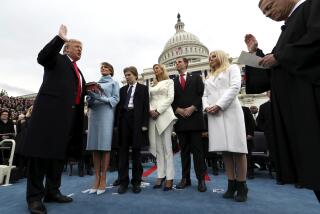Why is the Obama administration bowing to religion?
In a move sure to please religious conservatives, President Obama’s Justice Department filed a brief in the Supreme Court in favor of allowing overtly Christian prayers before city council meetings. It’s an inexplicable move, and it’s one more befitting a Republican administration than one headed by a Democrat and a constitutional scholar.
The case is Town of Greece vs. Galloway, and it’s set to be argued in the Supreme Court on Wednesday. Greece is a suburb of Rochester, N.Y. Until 1999, its Town Board opened meetings with a moment of silence — a practice that excludes no one. But then Town Supervisor John Auberger initiated a policy change, and the town began inviting clergy to open meetings with a prayer.
These prayers were decidedly and explicitly Christian. From 1999 to 2007, the town invited exclusively Christian ministers, most of whom included explicitly Christian content. Some elaborated on Christian theology, including such discussions as “the saving sacrifice of Jesus Christ on the cross” and “the plan of redemption that is fulfilled in Jesus Christ.”
These prayers were delivered to an audience of local citizens, including children and adults, who attend meetings at the Town Board’s invitation or direction. Children’s athletic teams are invited to be publicly honored, police officers and their families attend to participate in oath-of-office ceremonies, people come to speak about local issues of great personal importance, and would-be business owners come to request zoning permits.
All of these people — Christians and non-Christians — are asked to stand and bow their heads for many of these prayers. But Muslims, Jews and nonbelievers cannot in good conscience participate in a prayer to Jesus Christ, and doing so shouldn’t be the price of civic participation.
Two Greece residents — a Jew and an atheist — complained to the Town Board in 2007 about the prayer practice. Their complaints did produce an immediate, though short-lived, change to the prayer practice. The Town Board invited three non-Christians to deliver the opening prayer. But the town soon reverted to inviting only Christian clergy. Auberger and his allies were unmoved by further complaints about the practice, so the plaintiffs filed their lawsuit the following year.
All of this led to a federal appeals court concluding that the town’s prayer practice had unconstitutionally affiliated the town with Christianity. That conclusion reflected a faithful application of long-standing constitutional precedent. The establishment clause of the 1st Amendment is violated when a town so clearly links itself to Christianity, by inviting only Christian clergy to deliver prayers for a long period of time and those prayers being explicitly Christian.
Thirty years ago, in a case called Marsh vs. Chambers, the Supreme Court ruled that clergy can deliver nonsectarian prayers before state legislative meetings. The high court emphasized that the invocations at issue were nonsectarian, lacking any mention of specific deities. In fact, the Reagan administration defended the prayers at issue in Marsh on the ground that they were “strictly nondenominational” and “do not teach religious dogma.”
Remarkably, the Obama administration has backtracked from the position taken by the Reagan administration. It now argues that even explicitly sectarian prayers are permissible. Congress and state legislatures have prayers, but they are supposed to be and usually are nondenominational, and they are delivered to legislators rather than a captive audience of the broader citizenry assembled to do business before the board.
Given the state of the law, the importance of religious inclusivity and the facts of this case, I assumed that if the Obama administration participated at all, it would side with the plaintiffs. But the administration did just the opposite. In fact, because this is a suit not involving the federal government, it did not need to participate at all. It’s hard to fathom how the administration arrived at its conclusion, and I hope the Supreme Court will reject it.
I hope the court will take to heart the words of Justice Sandra Day O’Connor, who shortly before she stepped down from the court wrote in a decision: “At a time when we see around the world the violent consequences of the assumption of religious authority by government, Americans may count themselves fortunate.... Why would we trade a system that has served us so well for one that has served others so poorly?”
Why indeed? I wonder if the Obama administration has an answer.
Erwin Chemerinsky is dean of the UC Irvine School of Law.
More to Read
A cure for the common opinion
Get thought-provoking perspectives with our weekly newsletter.
You may occasionally receive promotional content from the Los Angeles Times.










